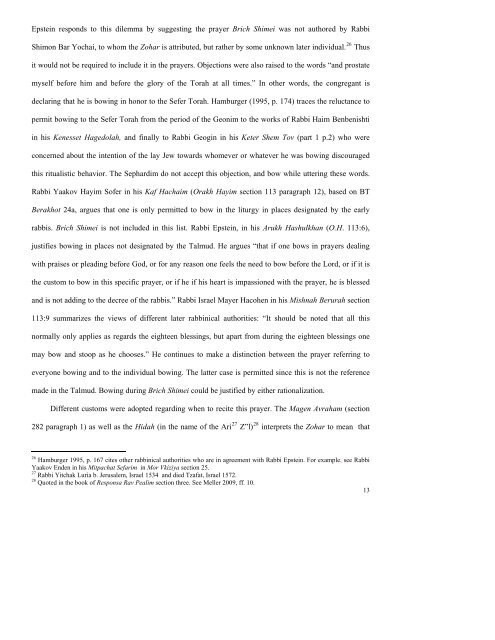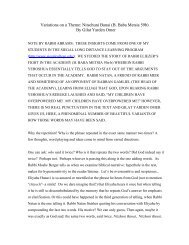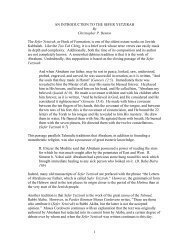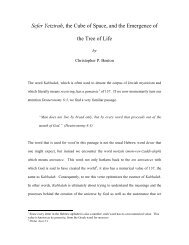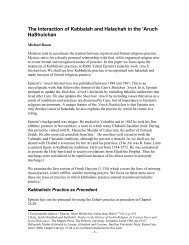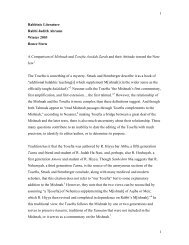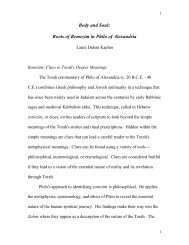The Symbolic Representation of the Sefer Torah - Maqom
The Symbolic Representation of the Sefer Torah - Maqom
The Symbolic Representation of the Sefer Torah - Maqom
You also want an ePaper? Increase the reach of your titles
YUMPU automatically turns print PDFs into web optimized ePapers that Google loves.
Epstein responds to this dilemma by suggesting <strong>the</strong> prayer Brich Shimei was not authored by RabbiShimon Bar Yochai, to whom <strong>the</strong> Zohar is attributed, but ra<strong>the</strong>r by some unknown later individual. 26 Thusit would not be required to include it in <strong>the</strong> prayers. Objections were also raised to <strong>the</strong> words “and prostatemyself before him and before <strong>the</strong> glory <strong>of</strong> <strong>the</strong> <strong>Torah</strong> at all times.” In o<strong>the</strong>r words, <strong>the</strong> congregant isdeclaring that he is bowing in honor to <strong>the</strong> <strong>Sefer</strong> <strong>Torah</strong>. Hamburger (1995, p. 174) traces <strong>the</strong> reluctance topermit bowing to <strong>the</strong> <strong>Sefer</strong> <strong>Torah</strong> from <strong>the</strong> period <strong>of</strong> <strong>the</strong> Geonim to <strong>the</strong> works <strong>of</strong> Rabbi Haim Benbenishtiin his Kenesset Hagedolah, and finally to Rabbi Geogin in his Keter Shem Tov (part 1 p.2) who wereconcerned about <strong>the</strong> intention <strong>of</strong> <strong>the</strong> lay Jew towards whomever or whatever he was bowing discouragedthis ritualistic behavior. <strong>The</strong> Sephardim do not accept this objection, and bow while uttering <strong>the</strong>se words.Rabbi Yaakov Hayim S<strong>of</strong>er in his Kaf Hachaim (Orakh Hayim section 113 paragraph 12), based on BTBerakhot 24a, argues that one is only permitted to bow in <strong>the</strong> liturgy in places designated by <strong>the</strong> earlyrabbis. Brich Shimei is not included in this list. Rabbi Epstein, in his Arukh Hashulkhan (O.H. 113:6),justifies bowing in places not designated by <strong>the</strong> Talmud. He argues “that if one bows in prayers dealingwith praises or pleading before God, or for any reason one feels <strong>the</strong> need to bow before <strong>the</strong> Lord, or if it is<strong>the</strong> custom to bow in this specific prayer, or if he if his heart is impassioned with <strong>the</strong> prayer, he is blessedand is not adding to <strong>the</strong> decree <strong>of</strong> <strong>the</strong> rabbis.” Rabbi Israel Mayer Hacohen in his Mishnah Berurah section113:9 summarizes <strong>the</strong> views <strong>of</strong> different later rabbinical authorities: “It should be noted that all thisnormally only applies as regards <strong>the</strong> eighteen blessings, but apart from during <strong>the</strong> eighteen blessings onemay bow and stoop as he chooses.” He continues to make a distinction between <strong>the</strong> prayer referring toeveryone bowing and to <strong>the</strong> individual bowing. <strong>The</strong> latter case is permitted since this is not <strong>the</strong> referencemade in <strong>the</strong> Talmud. Bowing during Brich Shimei could be justified by ei<strong>the</strong>r rationalization.Different customs were adopted regarding when to recite this prayer. <strong>The</strong> Magen Avraham (section282 paragraph 1) as well as <strong>the</strong> Hidah (in <strong>the</strong> name <strong>of</strong> <strong>the</strong> Ari 27 Z”l) 28 interprets <strong>the</strong> Zohar to mean that26 Hamburger 1995, p. 167 cites o<strong>the</strong>r rabbinical authorities who are in agreement with Rabbi Epstein. For example, see RabbiYaakov Enden in his Mitpachat Sefarim in Mor Vkiziya section 25.27 Rabbi Yitchak Luria b. Jerusalem, Israel 1534 and died Tzafat, Israel 1572.28 Quoted in <strong>the</strong> book <strong>of</strong> Responsa Rav Pealim section three. See Meller 2009, ff. 10.13


